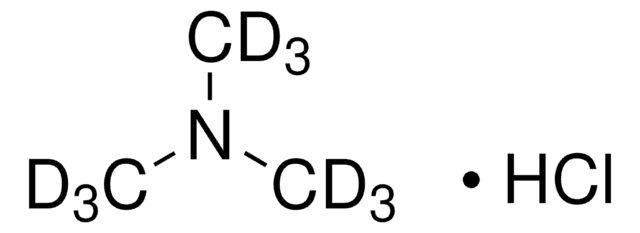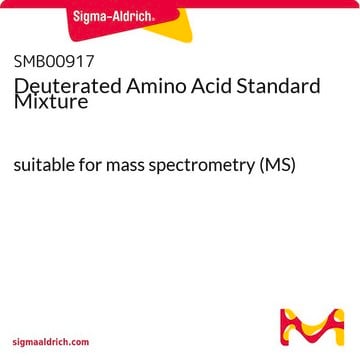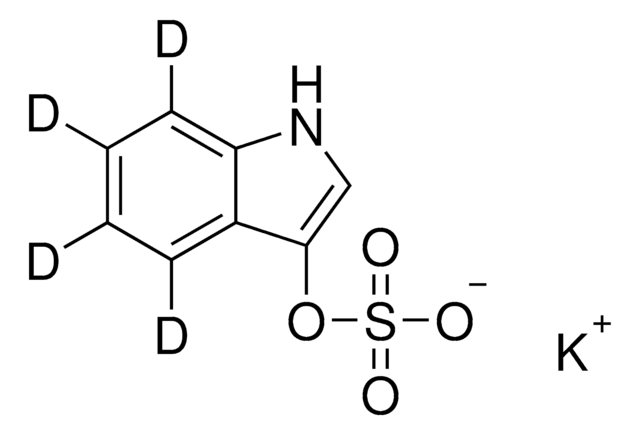791628
Trimethylamine-d9 N-Oxide
98 atom % D, 98% (CP)
Sign Into View Organizational & Contract Pricing
All Photos(1)
About This Item
Empirical Formula (Hill Notation):
C3D9NO
CAS Number:
Molecular Weight:
84.17
UNSPSC Code:
12352116
PubChem Substance ID:
Recommended Products
isotopic purity
98 atom % D
Assay
98% (CP)
form
solid
technique(s)
bio NMR: suitable
mass shift
M+9
SMILES string
[O-][N+](C([2H])([2H])[2H])(C([2H])([2H])[2H])C([2H])([2H])[2H]
InChI
1S/C3H9NO/c1-4(2,3)5/h1-3H3/i1D3,2D3,3D3
InChI key
UYPYRKYUKCHHIB-GQALSZNTSA-N
Related Categories
General description
Trimethylamine-d9 is isotopically enriched molecule.
Application
Trimethylamine-d9 N-oxide is used in the stability of hydrogen bonding between peptide, water with trimethylamine N-oxide.It is also used as an internal standard for the quantification of trimethylamine N-oxide by GC- or LC-MS.
Packaging
This product may be available from bulk stock and can be packaged on demand. For information on pricing, availability and packaging, please contact Stable Isotopes Customer Service.
Signal Word
Warning
Hazard Statements
Precautionary Statements
Hazard Classifications
Eye Irrit. 2 - Skin Irrit. 2 - STOT SE 3
Target Organs
Respiratory system
Storage Class Code
11 - Combustible Solids
WGK
WGK 3
Flash Point(F)
Not applicable
Flash Point(C)
Not applicable
Certificates of Analysis (COA)
Search for Certificates of Analysis (COA) by entering the products Lot/Batch Number. Lot and Batch Numbers can be found on a product’s label following the words ‘Lot’ or ‘Batch’.
Already Own This Product?
Find documentation for the products that you have recently purchased in the Document Library.
Customers Also Viewed
Zeneng Wang et al.
Analytical biochemistry, 455, 35-40 (2014-04-08)
Trimethylamine-N-oxide (TMAO) levels in blood predict future risk for major adverse cardiac events including myocardial infarction, stroke, and death. Thus, the rapid determination of circulating TMAO concentration is of clinical interest. Here we report a method to measure TMAO in
Xiang Zhou et al.
ESC heart failure, 7(1), 188-193 (2020-01-22)
Accumulating evidence has demonstrated that intestinal microbiota-dependent trimethylamine N-oxide (TMAO) is involved in the pathogenesis of various cardiovascular diseases. The present study was designed to investigate the prognostic value of TMAO in patients with chronic heart failure (CHF) after myocardial
Filip Meersman et al.
Biophysical journal, 97(9), 2559-2566 (2009-11-04)
Trimethylamine N-oxide (TMAO) is a naturally occurring osmolyte that stabilizes proteins, induces folding, and counteracts the denaturing effects of urea, pressure, and ice. To establish the mechanism behind these effects, isotopic substitution neutron-scattering measurements were performed on aqueous solutions of
Makiko Shimizu et al.
The Journal of toxicological sciences, 43(6), 387-393 (2018-06-08)
Medicinal carnitine-derived and dietary-derived malodorous trimethylamine and its non-malodorous metabolite trimethylamine N-oxide were historically regarded as nontoxic. Clinical and toxicological interest has recently arisen because of their potential association with atherosclerosis. We previously reported a human physiologically based pharmacokinetic (PBPK)
Tsung-Jen Lin et al.
Nutrition (Burbank, Los Angeles County, Calif.), 66, 29-37 (2019-06-16)
A plant-based diet has been associated with a reduced risk of cardiovascular (CV) diseases. This study aimed to determine the levels and correlations of CV-related biomarkers and the beneficial role of dietary habits. A total of 63 healthy vegetarians (n = 32)
Our team of scientists has experience in all areas of research including Life Science, Material Science, Chemical Synthesis, Chromatography, Analytical and many others.
Contact Technical Service














